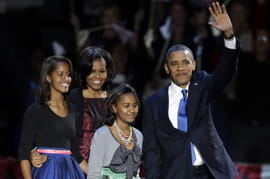Q&A with Bill Rosenberg: 2012 Election Results

Tuesday night’s election results declared incumbent President Barack Obama the victor after a long—and often bitter—campaign season. DrexelNow spoke with Dr. Bill Rosenberg of the College of Arts and Sciences’ History and Politics department and director of Drexel’s Survey Research Center about the outcome of this election, and what four more years of an Obama administration means for the United States.
Polls predicted that the race would be extremely close, but President Obama won by more than 100 Electoral College votes. Was this spread unexpected?
The perception that the race would be close was validated to a certain extent by the popular vote. The reality is that Barack Obama was probably less concerned about the popular vote and more concerned about the Electoral College vote. The Electoral College is specifically designed to distort the results of presidential elections to, in effect, generate a victor who seems to have stronger support than he or she actually does. An example of this could be Ronald Reagan in 1980. Except for a few small exemptions—namely, Maine and Colorado—if a candidate wins a state by one vote, he gets all of that state’s Electoral College votes, which basically creates a “winner takes all” situation. This enhances the candidate’s victory and instills a greater sense of triumph, or in some cases a mandate, for the winner.
How will his win affect bipartisan relationships?
We just had an election, and elections are supposed to have consequences. The side that wins is the side that the American public supports. In this case Obama was elected in a head-to-head contest about America’s future, and Americans took Obama’s side.
This victory really challenges Republicans to decide whether they are going to be a national party with national interests or a party that focuses on their more narrow congressional districts’ interests. By this I mean conservative philosophy may motivate Republican representatives to continue to be supported in a lot of congressional districts all over the country. But it may make it difficult to elect a presidential candidate from the Republican Party who is not in support of immigration issues, marriage equality and reproductive rights that are more broadly supported across the electorate.
Obama has to make a very clear decision about where he’s going to focus his attention at the start of his second term. There are many conservatives who fault Obama for spending a lot of effort on health care instead of jobs when he first came into office. I think it’s obvious now he was not just concerned with health care—he was also trying to revive the economy with various stimulus bills, but this imagery about a focus on jobs became a general narrative.
Now we’re approaching a fiscal cliff, where automatic cuts are going into place in terms of the federal budget and Bush-era tax cuts will end if new policies are not established and passed by the congress and president. We have a Republican House and a Democratic Senate with enough Republicans to filibuster, and a Democratic president. If they don’t decide to work together, we’ll be gridlocked, and nothing will be accomplished, which is not desirable by anyone. This hopefully forces Republicans and Democrats to work together, compromise and solve these problems. Bipartisanship is required.
Now that President Obama doesn’t have to worry about re-election, how might his leadership style change?
At the first presidential debate, Obama did not do well; he did not seem to be engaged and provided a rather poor showing. After that debate, Vice President Joe Biden came out and had a very strong performance. I think Obama learned from that experience since he came back and had two rather strong performances as well in the final debates. I think the first debate was somewhat of a humbling experience for Obama and afterward, he had to re-evaluate how he presents himself and how he’s going to go about his role as president.
Further, the leadership that he showed with the Hurricane Sandy situation helped considerably to propel him back into office. This combination of influences ultimately led him to win the White House again.
At this point, Obama is probably concerned about two things—solving problems and developing his legacy. In terms of problem solving, he doesn’t have to compromise quite so much since he no longer faces re-election. He does, of course, have to be willing to compromise in what he perceives as opportunities to pass bipartisan reforms that will help the economy and the political system—things that will ultimately define his legacy.
In This Article
Drexel News is produced by
University Marketing and Communications.
